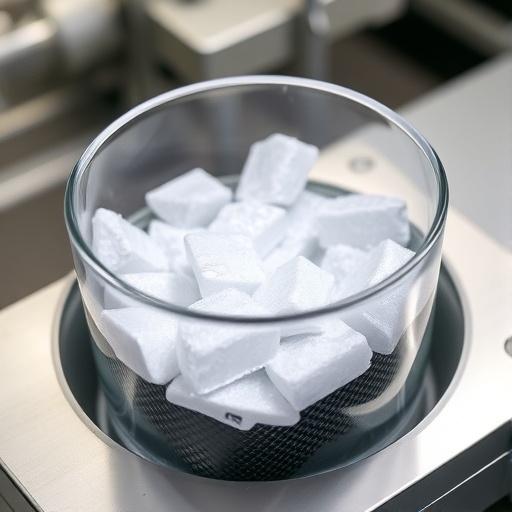In an intriguing development within the field of electrochemistry, researchers have recently unveiled enhanced electrochemical performance of sodium iron sulfate (Na₂₊₂ₓFe₂₋ₓ(SO₄)₃) through a novel composite carbon coating technique. This study, led by Liu, Z., Cao, Q., and Xie, L. et al., marks a significant step forward in the ongoing quest for sustainable and efficient energy storage solutions. It addresses the rising global demand for reliable energy resources and the critical necessity of developing materials that can facilitate this transition effectively.
The innovation in this research lies in the application of a carbon-coated composite on sodium iron sulfate. Electrochemical performance is crucial in determining the efficiency and effectiveness of materials used in batteries, and this study showcases how carbon coatings can dramatically enhance such characteristics. Through advanced synthesis techniques, researchers were able to create a composite structure that optimally integrates the active materials within the battery, thus improving conductivity and overall performance.
Sodium-ion batteries have emerged as a promising alternative to lithium-ion batteries due to the abundance of sodium and its lower environmental impact. However, the performance of sodium-ion batteries has often been limited by the electrochemical properties of the materials used. The new findings demonstrate that the introduction of composite carbon coating results in favorable interactions at the electrode interface, which significantly enhances the overall charge-discharge efficiency of the battery.
.adsslot_Snuj45lRai{ width:728px !important; height:90px !important; }
@media (max-width:1199px) { .adsslot_Snuj45lRai{ width:468px !important; height:60px !important; } }
@media (max-width:767px) { .adsslot_Snuj45lRai{ width:320px !important; height:50px !important; } }
ADVERTISEMENT
In addition to increased performance, the research also delves into the structural integrity of the coated materials during battery operation. As batteries cycle through countless charge/discharge cycles, maintaining structural stability is essential for longevity and reliability. Remarkably, the composite carbon coating not only improves conductivity but also contributes to reinforcing the structural properties of sodium iron sulfate, thereby enhancing its durability against mechanical stress and degradation.
The methodology employed in this study is noteworthy, involving a detailed assessment of synthesis parameters and the effects they have on the maze of interactions within the composite material. The team harnessed advanced characterization techniques such as scanning electron microscopy (SEM) and transmission electron microscopy (TEM) to visualize the microscale changes wrought by the carbon coating. This level of scrutiny is paramount as it offers insights into the mechanisms underlying the improved electrochemical behavior demonstrated by the material.
The implications of this research extend beyond merely enhancing battery performance; they touch on broader issues such as resource sustainability and environmental responsibility. As the world grapples with the challenges of climate change and the depletion of fossil fuels, innovations like those showcased in this study could pave the way for cleaner energy solutions. The ability to develop efficient sodium-ion batteries may help stabilize energy grids and provide power storage for renewable energy sources, such as solar and wind.
Moreover, this research could lead to future explorations in enhancing the performance of other electrode materials through similar coating techniques. The realm of composite materials is vast, and the principles unearthed in this study may ignite further investigations into optimizing combinations of different metal sulfates and carbon materials, potentially leading to even more advanced energy storage solutions.
The collaborative effort highlighted in this research underscores the importance of interdisciplinary approaches in the advancement of battery technology. Researchers from diverse fields, including materials science, electrochemistry, and nanotechnology, played crucial roles in bringing this project to fruition. Such collaborations are increasingly vital in tackling the multifaceted challenges presented by modern energy storage needs, as innovative solutions often arise from the fusion of ideas and expertise across disciplines.
In summary, the enhanced electrochemical performance of Na₂₊₂ₓFe₂₋ₓ(SO₄)₃ achieved through composite carbon coating represents a major leap forward in energy storage technology. With sustainability at the forefront of global energy discussions, the implications of these findings resonate far beyond academic circles. They inspire hope for a future where clean, reliable, and efficient energy solutions are not only a possibility but a reality, benefiting both society and the environment.
In conclusion, as the scientific community continues to investigate and innovate within the field of energy storage, the research led by Liu, Cao, Xie, and their colleagues serves as a beacon of progress. It emphasizes the importance of continued exploration into novel material combinations and underscores the potential for new methodologies to transform how we approach energy challenges in the coming years. As demand for sustainable energy continues to grow, innovations like these will undoubtedly play an increasingly critical role in shaping a greener future.
Subject of Research: Enhanced electrochemical performance of Na₂₊₂ₓFe₂₋ₓ(SO₄)₃ via composite carbon coating.
Article Title: Enhanced electrochemical performance of Na₂₊₂ₓFe₂₋ₓ(SO₄)₃ via composite carbon coating.
Article References: Liu, Z., Cao, Q., Xie, L. et al. Enhanced electrochemical performance of Na₂₊₂ₓFe₂₋ₓ(SO₄)₃ via composite carbon coating.Ionics (2025). https://doi.org/10.1007/s11581-025-06602-9
Image Credits: AI Generated
DOI: https://doi.org/10.1007/s11581-025-06602-9
Keywords: Sodium-ion batteries, electrochemical performance, carbon coating, sustainable energy storage, composite materials, structural integrity, energy efficiency, renewable energy solutions.
Tags: advanced synthesis techniques in materialscarbon coating techniquecomposite carbon materials in batterieselectrochemical performance enhancementelectrochemistry innovationsenergy resource reliabilityenvironmentally friendly battery alternativesimproved conductivity in battery materialssodium iron sulfate performancesodium-ion battery advancementssustainable battery technologysustainable energy storage solutions





